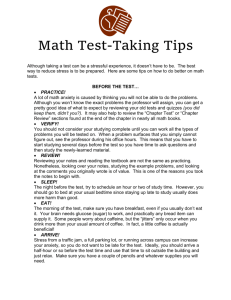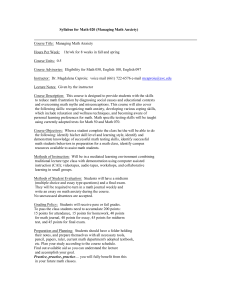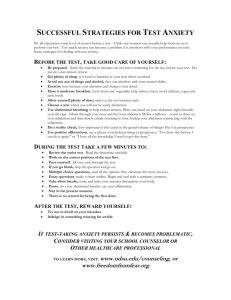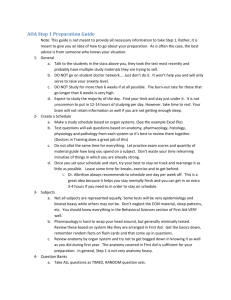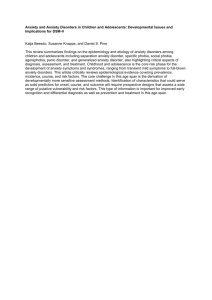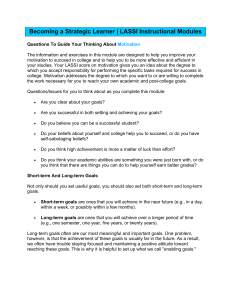Reducing Test Anxiety
advertisement
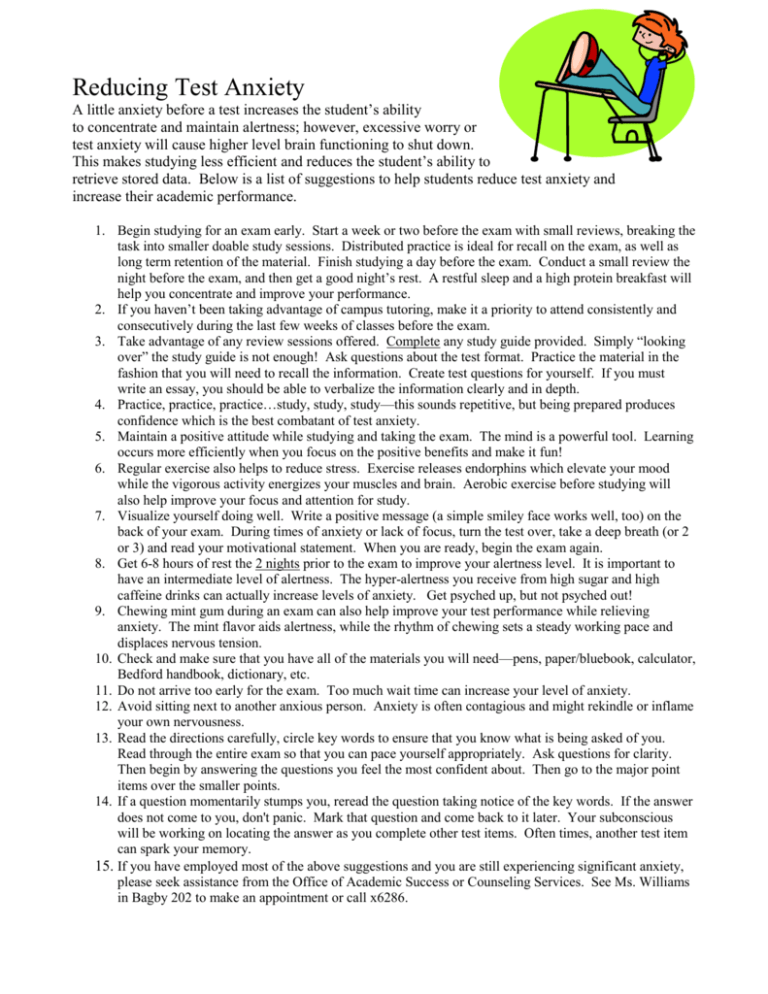
Reducing Test Anxiety A little anxiety before a test increases the student’s ability to concentrate and maintain alertness; however, excessive worry or test anxiety will cause higher level brain functioning to shut down. This makes studying less efficient and reduces the student’s ability to retrieve stored data. Below is a list of suggestions to help students reduce test anxiety and increase their academic performance. 1. Begin studying for an exam early. Start a week or two before the exam with small reviews, breaking the task into smaller doable study sessions. Distributed practice is ideal for recall on the exam, as well as long term retention of the material. Finish studying a day before the exam. Conduct a small review the night before the exam, and then get a good night’s rest. A restful sleep and a high protein breakfast will help you concentrate and improve your performance. 2. If you haven’t been taking advantage of campus tutoring, make it a priority to attend consistently and consecutively during the last few weeks of classes before the exam. 3. Take advantage of any review sessions offered. Complete any study guide provided. Simply “looking over” the study guide is not enough! Ask questions about the test format. Practice the material in the fashion that you will need to recall the information. Create test questions for yourself. If you must write an essay, you should be able to verbalize the information clearly and in depth. 4. Practice, practice, practice…study, study, study—this sounds repetitive, but being prepared produces confidence which is the best combatant of test anxiety. 5. Maintain a positive attitude while studying and taking the exam. The mind is a powerful tool. Learning occurs more efficiently when you focus on the positive benefits and make it fun! 6. Regular exercise also helps to reduce stress. Exercise releases endorphins which elevate your mood while the vigorous activity energizes your muscles and brain. Aerobic exercise before studying will also help improve your focus and attention for study. 7. Visualize yourself doing well. Write a positive message (a simple smiley face works well, too) on the back of your exam. During times of anxiety or lack of focus, turn the test over, take a deep breath (or 2 or 3) and read your motivational statement. When you are ready, begin the exam again. 8. Get 6-8 hours of rest the 2 nights prior to the exam to improve your alertness level. It is important to have an intermediate level of alertness. The hyper-alertness you receive from high sugar and high caffeine drinks can actually increase levels of anxiety. Get psyched up, but not psyched out! 9. Chewing mint gum during an exam can also help improve your test performance while relieving anxiety. The mint flavor aids alertness, while the rhythm of chewing sets a steady working pace and displaces nervous tension. 10. Check and make sure that you have all of the materials you will need—pens, paper/bluebook, calculator, Bedford handbook, dictionary, etc. 11. Do not arrive too early for the exam. Too much wait time can increase your level of anxiety. 12. Avoid sitting next to another anxious person. Anxiety is often contagious and might rekindle or inflame your own nervousness. 13. Read the directions carefully, circle key words to ensure that you know what is being asked of you. Read through the entire exam so that you can pace yourself appropriately. Ask questions for clarity. Then begin by answering the questions you feel the most confident about. Then go to the major point items over the smaller points. 14. If a question momentarily stumps you, reread the question taking notice of the key words. If the answer does not come to you, don't panic. Mark that question and come back to it later. Your subconscious will be working on locating the answer as you complete other test items. Often times, another test item can spark your memory. 15. If you have employed most of the above suggestions and you are still experiencing significant anxiety, please seek assistance from the Office of Academic Success or Counseling Services. See Ms. Williams in Bagby 202 to make an appointment or call x6286.



